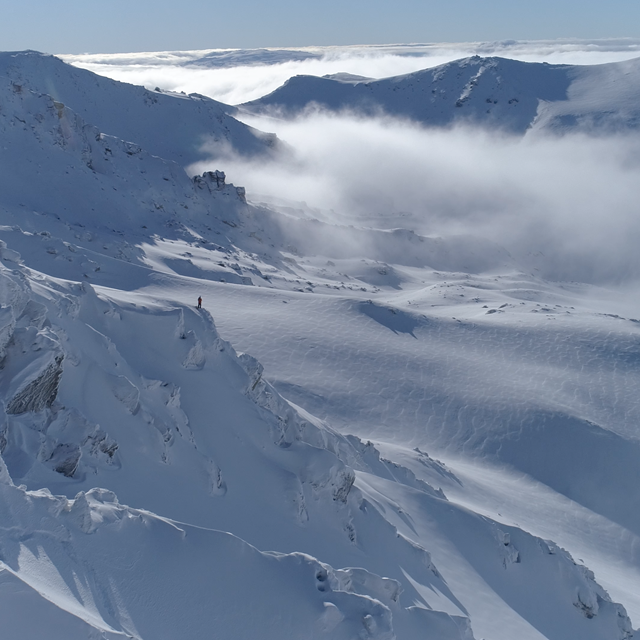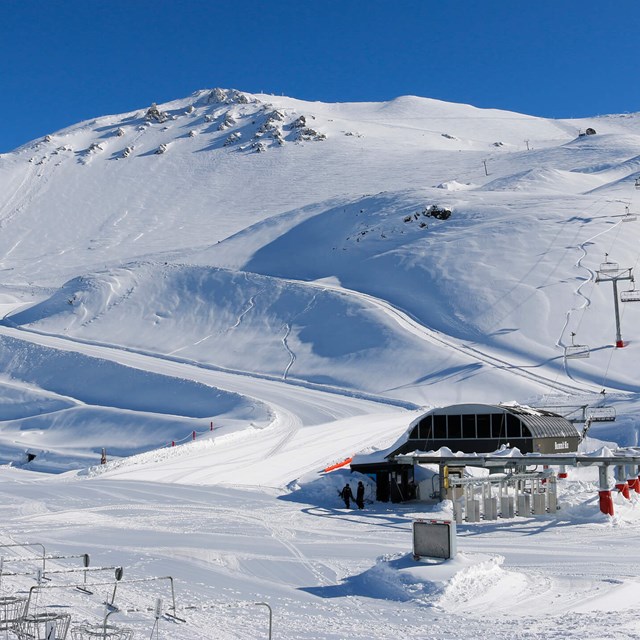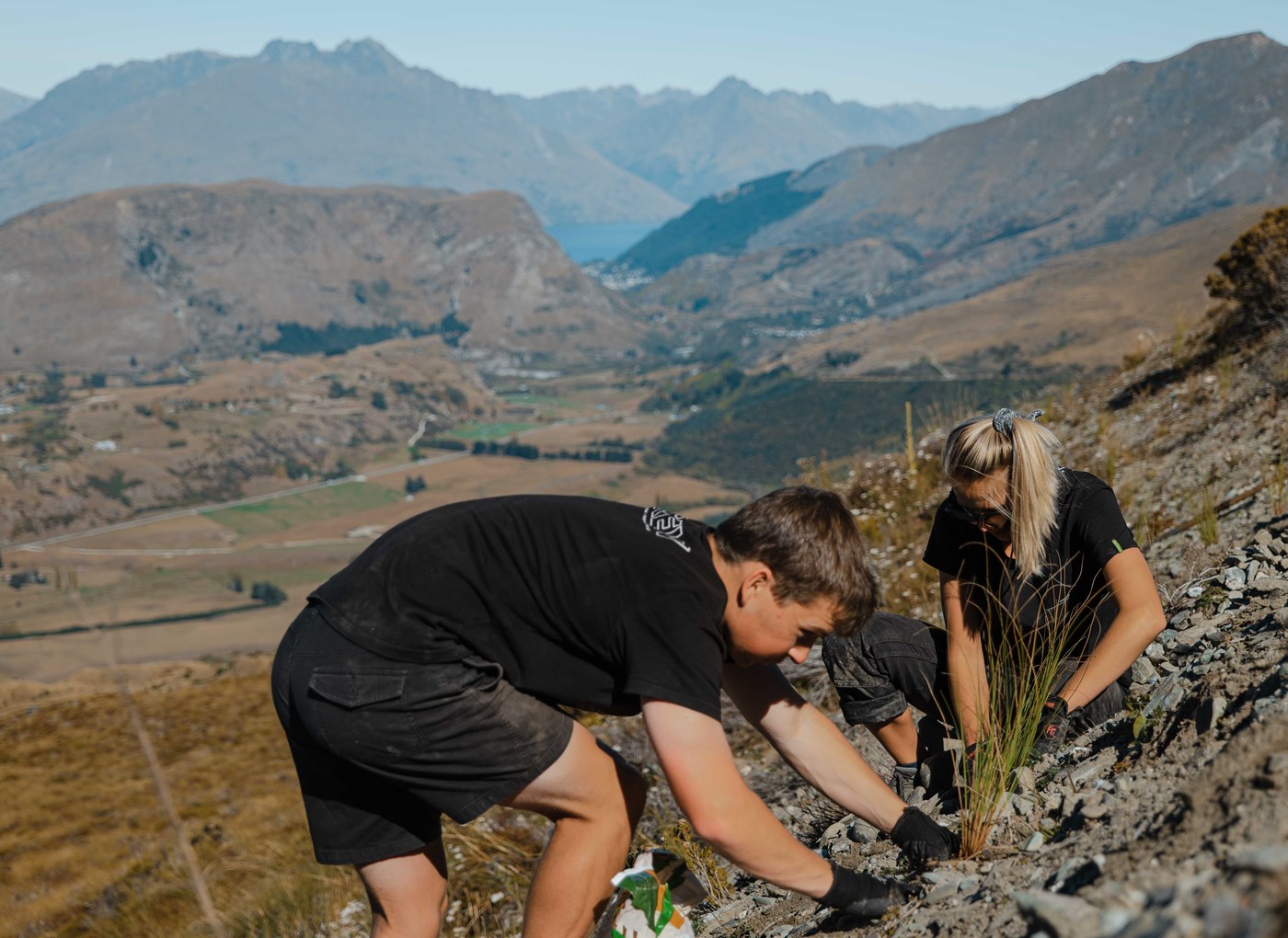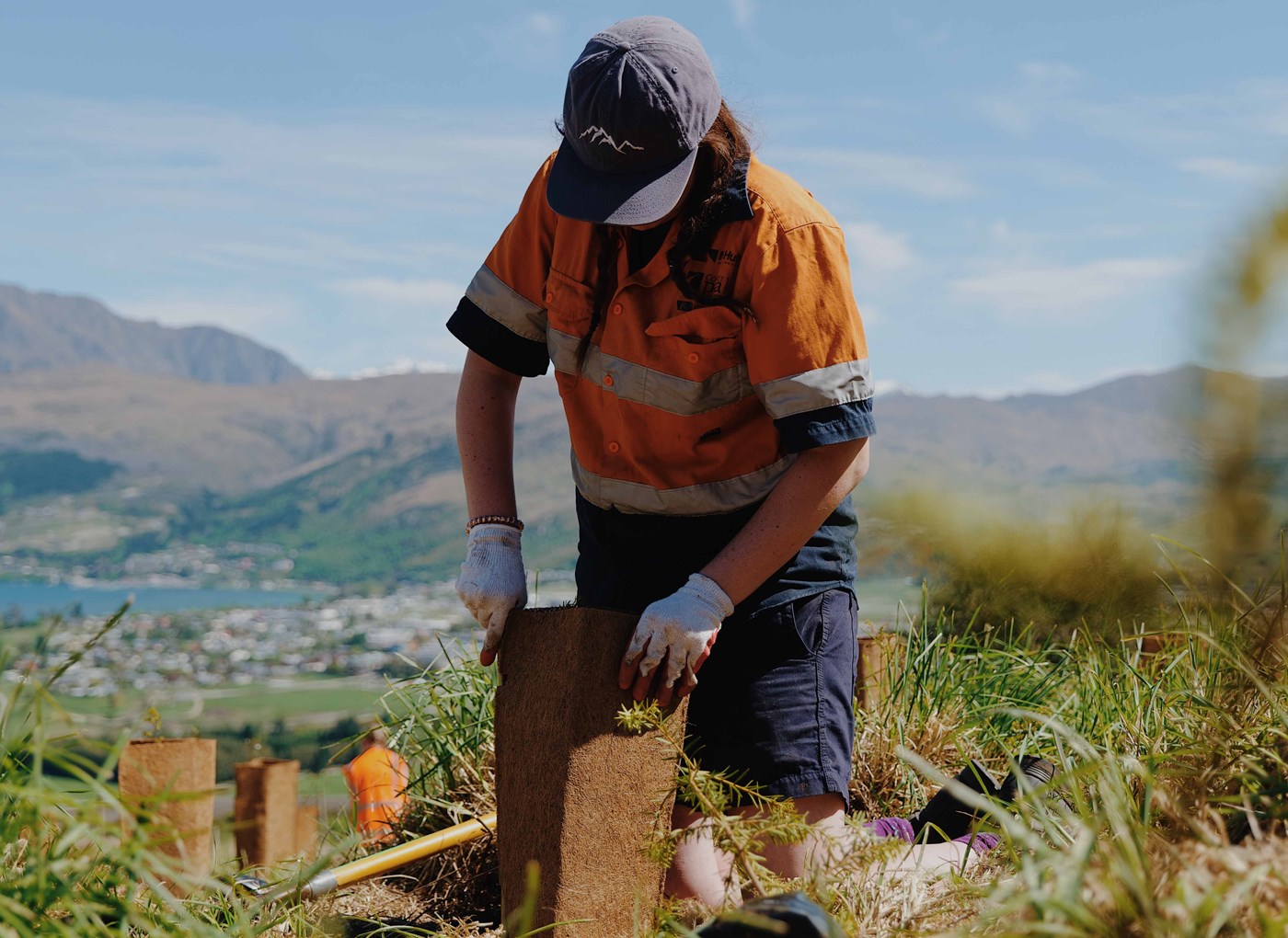
OUR ENVIRONMENTAL COMMITMENT
As Kaitiaki of the mountains, we have an enduring responsibility to our environment, people, and communities to ensure they benefit from our presence.
This year we have made a commitment to be carbon neutral by 2030. We know it's a big goal, but we're ready for it, and we're already part way there.
We're proudly guided by the concepts of kaitiakitanga (meaning: guardianship and protection) and manaakitanga (meaning: respect, generosity and care). We understand and acknowledge that our environment is the backbone of our operation, and it’s our responsibility to look after it.
We don't take anything we do for granted and our promise to share our passion for the mountain has never felt as important as it does right now, as we begin our journey to carbon neutral by 2030.
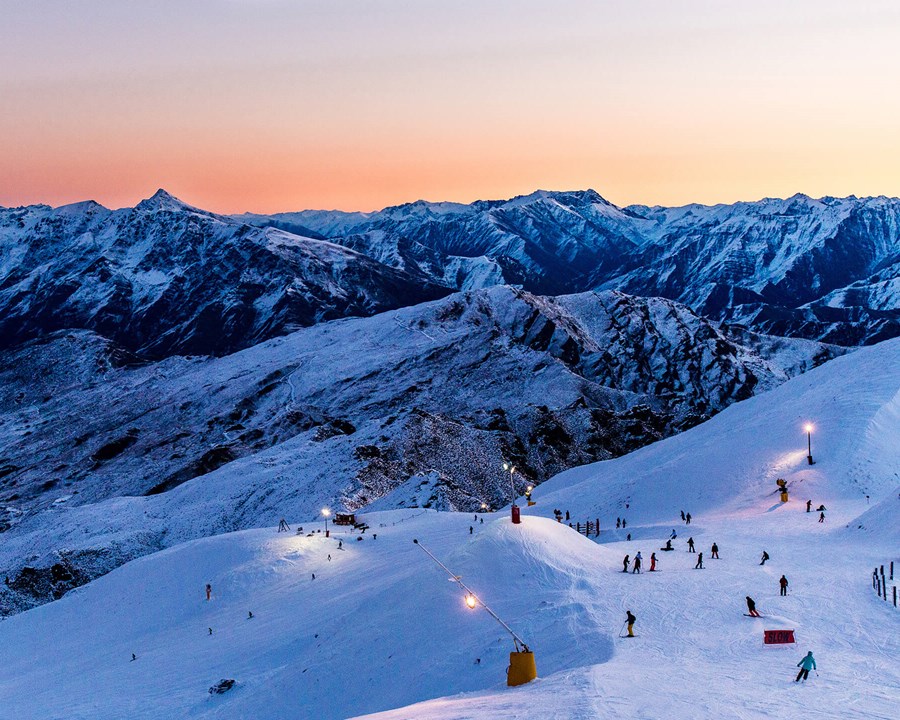
Road to Carbon Neutral
At NZSki our primary greenhouse gas emission sources are diesel fuel - used for grooming and transport - and electricity. Together our three mountains produce approximately 3000 tonnes of greenhouse gas emissions (Scope 1 and 2 only) annually.
To kick start our journey of becoming carbon neutral by 2030, we have committed to reduce net carbon emissions by 50% in 2023. Here's how we plan to do that:
1. We’ve purchased Meridian Energy’s Certified Renewable Energy product. In conjunction with our emission reduction programs it also means we can report our market-based scope 2 emissions as zero* (our scope 2 emissions are currently reported as over 1000T per annum).
2. Purchasing Carbon Credits from Carbonz – the credits come from native vegetation blocks in the Otago and Canterbury regions; for 2023 this offsets 400T.
3. The continuation of NZSki’s Emission Reduction Initiatives.
*Using the market-based reporting methodology as per the GHG Protocol’s Scope 2 Guidance.
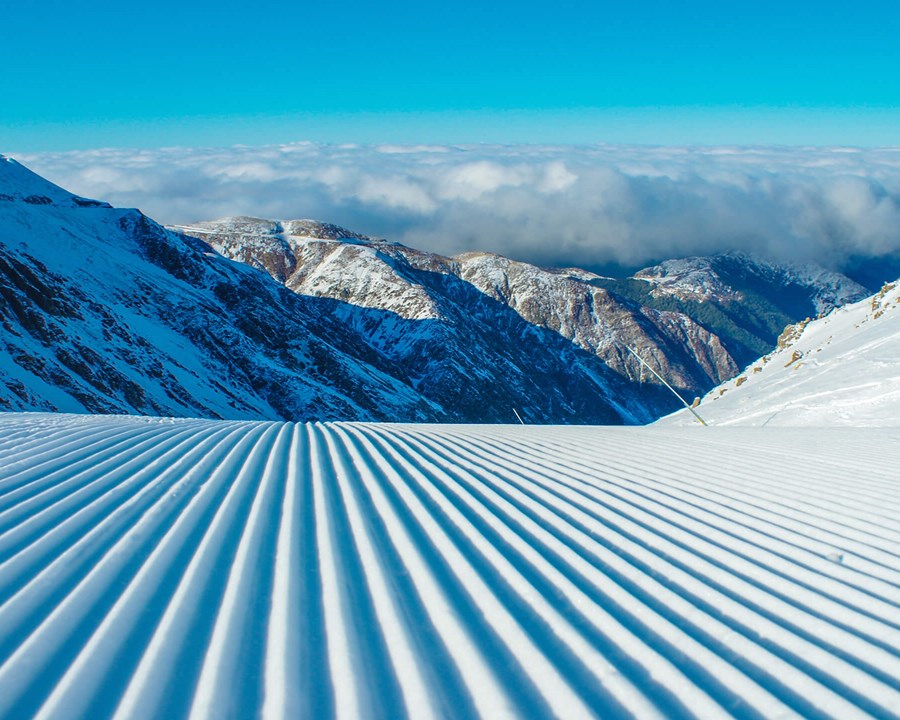
Coronet Peak
Coronet Peak was established as a ski area in 1947. Before and during that time it was also an active farm. In the 1990s the ski area grew in popularity and farming ceased which has allowed the primary ground cover, Dracophyllum (Snow) Tussock, to flourish. At Coronet Peak we work to control and eliminate non-native plants and pests, rejuvenate the area and bring back the native Karearea – New Zealand Falcon.
The Remarkables
At The Remarkables we have a five-year partnership with The Kea Conservation Trust to work together to bring back the kea to our mountain. Through this partnership we provide funds for research and education, volunteer our time to help monitor kea, and work to ensure the mountain is a habitable environment for them enjoy. Along with pest control and revegetation projects we work hard to minimise waste and reduce our carbon emissions.
Mt Hutt
At Mt Hutt our goal is to become a carbon neutral ski area. We have invested heavily in upgrading equipment and waste management initiatives across the mountain as well as native planting. In 2020 we saw the return of a kea to our mountain. This native parrot hasn't been around for many years so it's proof our work to eliminate pests and revegetate our mountain is working.
On the mountains
Biodiversity
NZSki has established a strong record of enhancing the biodiversity on our ski areas through initiatives, including:
- Weed and pest control
- Hare control
- Wilding pine eradication
- Revegetation through propagation of the existing flora (eg. tussock seeding)
Wetland areas on our ski fields are preserved by creating terrain around them, or through relocation initiatives, for example removing small wetland areas, holding it safely and then replanting in the reinstated wetlands.
Restoration and Revegetation
If we are modifying land for trails or infrastructure, any native flora that might be disturbed is removed and propagated in other areas of the mountain. When it’s time, these plants go back to the development area and are re-planted to ensure the landscape is restored.
As well as restoring areas where development takes place, we also revegetate other areas of the ski area. Seeds from native plants are hand-collected, taken to a nursery to grow, then returned, and planted across the mountain.
We use seed from plants already in our environment to make certain the mountain is planted with flora that are native to, and bred for, our unique alpine conditions.
We have over 8,000 native plants in nurseries to plant over the next couple of years.
Waste reduction
We operate a strong policy of waste minimisation initiatives across our three ski fields, specifically in the reduction of food packaging waste, for example:
- Removal of single-use plastic sauce portions replaced with re-fillable industrial size bottles
- Encouraging the use of ceramics across all food and beverage
- Providing compostable paper coffee and soup cups
- Single-serve grab-and-go compostable cardboard holders
- Recycling stations across food and beverage and recycling at back of house
Energy efficiency
We focus on lowering energy usage across our operations, for example, each one of our buses offsets 50-60 cars per day making it by far the most environmentally and economically sustainable form of transport to the mountains. This transport service is well in alignment with both the POW and TIA objectives with a newer, more efficient fleet that encourages the use of public transport.
Our new snowmaking technology is highly efficient too. For example, Coronet Peak’s state of the art snowmaking system uses 95% recycled water sourced from high-altitude water storage reservoirs, which at 1200m above sea level keeps the water at about 0C, at least 20% more energy-efficient than from other sources. And we’re constantly investing in new equipment which runs more efficiently.
Passionate staff
Our staff have a genuine passion for the environment and this sets the foundation for what we can achieve in this area. Across our fields, we have volunteers who assist with projects including waste sorting, replanting of native vegetation, wilding pine eradication and trapping for pests to protect bird wildlife.
For example, at the Remarkables, a formal committee meets every week to take action on improving education, waste management and environment conservation at the ski field, while at Hutt, a team of volunteers plant native trees for carbon offsetting. In 2017 Coronet Peak staff volunteers removed wilding pines (which are an introduced species), onsold them as Christmas trees with all monies being donated to a local charity.
Fairtrade and Better Cotton uniforms
Through our partnership with Kathmandu, our staff uniforms are socially and environmentally sustainable, and in some cases a mix of recycled cotton and virgin cotton.
A large portion of the crew collection is certified Fair Trade meaning these were manufactured by people receiving a living wage.
Kathmandu is also a member of Better Cotton Initiative (BCI) cotton, a non-profit global organisation that works with a diverse range of stakeholders across the cotton supply chain to promote measurable and continuing improvements for the environment, farming communities and the economies of cotton-producing areas.

